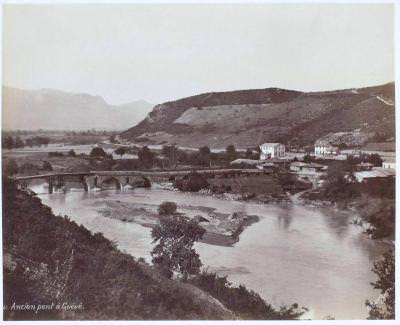In 1914, seven villages were either exclusively or partially inhabited by Armenians. The towns of Geyve and Eçme, on the banks of the Sakarya River, were inhabited by 2,168 ‘Armenian speaking Greeks,’ or Greek Orthodox Armenians whose ancestors had come from Akn. The village of Kıncılar, on the opposite bank of the river, facing Eçme, was inhabited by 2,265 Armenians, whose roots were also in Akn.
On the south, on both sides of the railroad, were the villages of Kurdbelen, on the left bank of the river, and Gökgöz, on the right bank, with a total population of 3,923. The last village, Akhisar, on the left bank of the Sakarya, had a population of 272 inhabitants. These Armenians were deported in August 1915, after the kaymakam of Geyve, Said Bey, had been replaced by Tahsin Bey. Said Bey, who held his post in Geyve from 19 September 1913 to 21 August 1915, had refused to carry out the deportation order.[1]
Geyve Town (Gr: Kaviya; Kabaia; Kyvala)

The town has a history of four thousand years of settlement; in the early 20th century it was a regional center for vegetable trade. Until 1920, the districts of Çiftlik and Kepekli were inhabited by Armenians and Greeks, while the population of the city centre was Turkish (Manav Turks). At the end of the 18th century, the population consisted of about 2,000 Turkish households, 1,500 Armenian households and 1,000 Armenian households of Greek Orthodox faith. After the deportation of the Christian population in September 1916, Lazes from the Karesı (Karası, Karasu) / Balıkesir kaza were settled in their homes.[2]
In July and October 1920, more than 600 Christians, predominantly Greeks, were massacred by Kemalists.
TURKISH ATROCITIES
DILATORY BRITISH
(The “Times” Cables)
LONDON, July 28.
The correspondent of the “Times” at Constantinople reports that the Nationalists [Kemalists] have massacred hundreds of Greeks and Armenian civilians at Geive [Geyve], and there have been numerous murders elsewhere. These crimes were quite unprovoked.
The conduct of the Greek [Hellenic] troops has been exemplary, but they will be difficult to restrain if they find more butchered Christians. The British Government is blamed for dilatoriness in trying the Turks interned at Malta who are charged in connection with massacres. These were invariably authorised from above. So far only one man has been hanged. If a few more of the more highly placed Turks know they risked their own necks the massacres would probably cease.
Source: The Maitland Daily Mercury (NSW : 1894 – 1939), p. 5. https://www.greek-genocide.net/index.php/bibliography/newspapers/353-turkish-atrocities